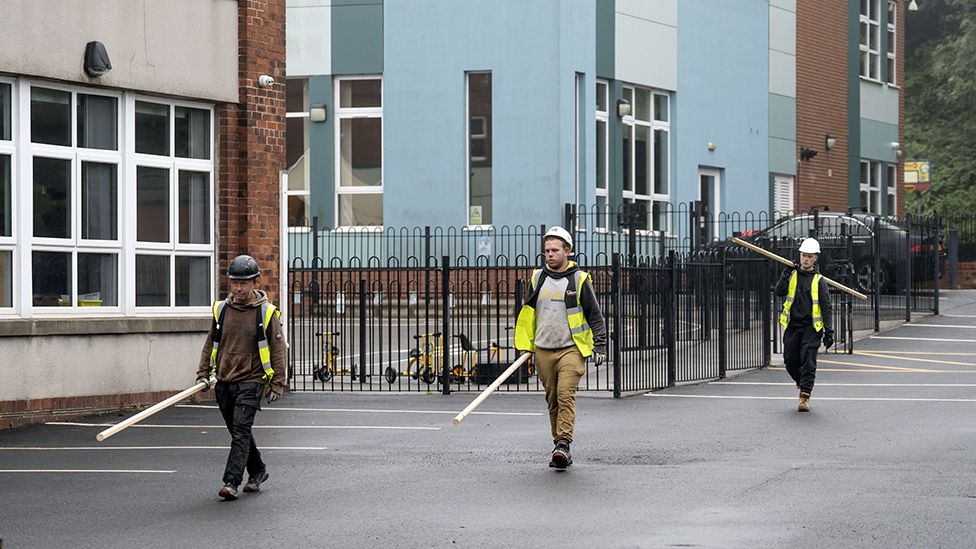
Alternative meal arrangements are being made for pupils at Abbey Lane Primary School in Sheffield
More than 150 schools in England have been identified as having a type of potentially dangerous concrete – with many now closing buildings or classrooms to make them safe.
The government has not yet published a list of which schools are affected – but BBC News is trying to find out through schools themselves. The list is being constantly updated and you can tell us about your school below.
- Do you know of a school that is affected? Share information in confidence by emailing haveyoursay@bbc.co.uk
Which schools have closed buildings?
The government is not publishing a list, as it says it wants parents to hear from headteachers and principals about closures first.
So far, BBC News has learned the following schools are affected:
- Abbey Lane Primary School, Sheffield, South Yorkshire – work started in July to replace the RAAC in the roof over the kitchen, and alternative meal arrangements are now being made for pupils
- Arthur Bugler Primary School, Standford-le-Hope,Thurrock – The building for years 4, 5 and 6 will be closed and the start of the new school term could be delayed until 11 September for those year groups
- The Appleton School, Essex – the Tower, North and South blocks are being vacated. Years 8, 9 and 10 are being moved to online learning from home from Wednesday to Friday
- The Billericay School, Billericay, Essex – some parts of the school are shut and some pupils will learn remotely – more from Essex here, where 50 schools are fitted with the concrete
- Buckhurst Hill Community Primary School, Essex – school closed until Monday 11 to all pupils to organise alternative teaching arrangements
- Canon Slade School, Bolton, Greater Manchester – some areas are closed for safety reasons, local press reports say
- Carmel College and Sixth Form, Darlington, County Durham – kitchen and library are closed but the school will remain open
- Clacton County High School, Clacton, Essex – start of term is delayed with some remote learning
- Claydon High School, Ipswich, Suffolk – the school is considering delaying reopening, or only opening partially for the new term
- Cleeve Park School, Sidcup – 4 classrooms, the gym and some admin offices will be closed
- Cockermouth School, Cockermouth, Cumbria – pupils will return to school a day later because of RAAC found in four corridors, the library and sports hall
- The Coopers’ Company and Coburn School, Essex – no students in school on Monday 4 September or Tuesday 5 September
- Corpus Christi Catholic Primary School, Brixton, London – a statement from 18 August says juniors are to be relocated to a neighbouring school
- Cranbourne College, Basingstoke, Hampshire – one area has been closed since the start of the year, temporary works are in another part but the school remains open
- Crossflatts Primary School, Bradford, West Yorkshire – the school is partially closed with pupils moved to different areas of the building. Temporary buildings are in place
- Donnington Wood Infants School, Donnington, Telford, Shropshire – has had extra temporary ceilings added and will remain open
- East Bergholt High School, Colchester, Essex – the school is considering whether to delay reopening or partially close
- Eldwick Primary School, Bradford, West Yorkshire – Bradford Council has also confirmed some buildings are closed
- The Ellen Wilkinson School, London – students have been told to bring in packed lunches while the canteen is out of use, though children on free school meals will be given vouchers. The science block, the old gym and the hall are also being vacated
- Farlingaye High School, Woodbridge, Suffolk – the school says it may need to delay the start of term because some classrooms are out of action
- Fulwood Secondary, Preston, Lancashire – the school will not open as planned for at least the first two days of term. Parents may be told more on Monday after a meeting with school advisers
- Ferryhill School, a secondary in County Durham – the start of the new school year will be delayed. New starters would start a week late with the rest being taught online, it said. One parent said his Year 7 daughter was apprehensive about starting school and this put them in a “difficult position”
- The Gilberd School, Colchester, Essex – the school will not reopen until 11 September for students in Year 8-11, with Year 7 pupils returning a day later
- Greenway Junior School, Horsham – the school will be closed for all pupils on Tuesday. Plans for beyond this date remain unclear
- Hadleigh High School, Hadleigh, Suffolk – considering a delay of the new term
- Hatfield Peverel Junior School, Chelmsford, Essex – the school is closed until at least mid-September. Temporary classrooms are needed
- Hockley Primary School, Hockley, Essex – closed since 11 June, some year groups are being sent to other schools
- Holy Trinity Catholic Academy, Newark-on-Trent, Nottinghamshire – issues have been identified on site but the school will open as planned
- Honywood School, Colchester, Essex – 22 classrooms must be closed with immediate effect, with some pupils to do online learning and a rota system for year groups in school
- Jerounds Primary School in Harlow, Essex – RAAC was detected in the school’s kitchen but is being strengthened by a steel structure and the school will stay open
- Katherines Primary Academy, Harlow, Essex – the main building is closed
- Kingsdown School, Southend-on-Sea, Essex – the special school for children aged from three to 14 years old was told on Thursday to close its main building
- Mayflower Primary School, Leicester, Leicestershire – also found out it was affected before the summer holidays
- Myton School, Warwick, Warwickshire – the start of term has been delayed
- Northampton International Academy – the use of the top floor, including 18 classrooms, has been restricted. The sixth-form area and new staff room are closed while survey work is carried out
- Our Lady’s Catholic High School, Preston, Lancashire – closed on Monday and Tuesday
- Outwoods Primary School, Atherstone, North Warwickshire – work began earlier this year to install support as a precaution, but the school will remain open
- Parks Primary, Leicester, Leicestershire – back in May, the school had to relocate several classes and borrow rooms from other institutions after the discovery of RAAC
- Pershore High School, Worcestershire – a temporary building currently housing a drama teaching space and costume store has been taken out of use, meaning drama lessons will be moved
- Ramsey Academy, Halstead, Essex – four classrooms have been vacated and are out of use until safety measures are in place
- Ravens Academy, Clacton-On-Sea, Essex – the school will be closed for two days next week, on 5 and 6 September
- Scalby School, Scarborough – will not reopen until Monday 11 and reopening is likely to be a mix of face-to-face and online home learning. More details expected on Tuesday
- St Bartholomew’s Catholic Primary School, Kent – the hall is shut but the headteacher has written to parents to say the rest of the school is safe. Hot lunches will be prepared in the school kitchen and served in classrooms
- St Bede’s Catholic School and Byron Sixth Form College, County Durham – parts of school building out of use, working to finalise arrangements and will be in touch on Monday
- St Clere’s School, Stanford-le-Hope, Essex – parts of the school need to close, with some pupils to learn from home
- St Gregory’s Catholic Science College, Harrow, London – work is being done to prop up the concrete and is expected to be resolved by Tuesday
- St James Catholic Primary School, Hebburn, Tyne and Wear – the school has been vacated, and staff are finalising alternative arrangements
- St Leonard’s School, Durham, County Durham – the school will not be able to open as planned
- St Teresa’s Catholic Primary School, Darlington, County Durham – closed until 11 September
- St Thomas More Catholic Comprehensive, Eltham, London – open but parts of the hall, gym, canteen, drama studio, alps and girls’ and boys’ toilets are closed, and the school needs to open mobile toilet blocks
- Tendring Technology College, Frinton Campus, Essex – some years will start later, on 11 September
- Thomas Lord Audley School, Colchester, Essex – Areas within the science and maths departments have been deemed unsafe and 10 of 47 classrooms are not in use
- Thurstable school and sixth form, Essex – remote learning on Wednesday 6 September with no students in school, Thursday 7 September – just year 7 in school, and Friday 8 September years 7,11,12 and 13 in school with remote learning for other years
- White Hall Academy primary, Clacton, Essex – the school is carrying out surveys and parents were told on Friday there will be three non-teaching days
- Willowbrook Mead Primary Academy, Leicester, Leicestershire – parents were told in a letter from the school, seen by the BBC, about complex arrangements to send children from different year groups to two different schools, and give older children home schooling
- Winter Gardens Academy, Canvey Island, Essex – parts of the school are to be vacated with immediate effect
- Wood Green Academy, Wednesbury, West Midlands – some classrooms will be closed until October
- Woodville Primary School, South Woodham Ferrers, Chelmsford, Essex – school closed until 11 September
- Wyburns Primary School, Rayleigh, Essex – possibly closed for up to two weeks
How many schools are affected in total?
The Department for Education (DfE) said 156 school buildings were identified as having this type of concrete, RAAC (find out more about the concrete here). Of them, 52 were at risk of sudden collapse and action was taken immediately to make them safe, for example by propping up the concrete.
The other 104 are currently scrambling to put safety measures in place to stay open.
Schools with RAAC only have to close or partially close if they do not have safety measures in place, and cannot make alternative arrangements – such as converting other parts of the building into temporary classrooms or moving children to another site.
We’re not sure how many schools are having to close, but think as many as 24 of them may have to.
But more schools may be affected by RAAC. Back in June, a report by the National Audit Office assessed that 572 schools had been identified where RAAC might be present. Engineers at schools across the country have been carrying out surveys to work out where the problems are.
Where are schools being checked over?
Engineers have been carrying out surveys across England to work out where the problems are. While this work affects most councils, some are also announcing how many of their schools are being surveyed:
- Kingston – the council says 13 community and foundation schools and 45 other council buildings have been identified and they have ordered further checks
- Hertfordshire – several school buildings in the county are to be surveyed. No school in the county needs to close currently. The council previously identified and fixed three schools with RAAC last year
- Lancashire – after an initial survey of all schools, 17 schools are going to have detailed surveys done due to their age as a precautionary measure, the council says
- Nottinghamshire – the council says Carnarvon Primary School, Bingham, Nottingham needs further checks, although no immediate issues have been identified
Other UK nations
- Northern Ireland – schools in Northern Ireland are being checked for collapse-prone concrete as a matter of urgency
- Scotland – at least 12 schools have been identified with RAAC. There are five in West Lothian, two in the Highlands, two in Edinburgh and one each in Perth and Kinross, Moray and East Lothian. No school has been completely closed. Figures obtained by the Scottish Liberal Democrats in May found at least 37 schools in Scotland have buildings that contain RAAC
- Wales – schools and colleges are being surveyed for RAAC but no institutions have reported having the material
Do you know of a school that is affected? Share information in confidence by emailing haveyoursay@bbc.co.uk.
Please include a contact number if you are willing to speak to a BBC journalist. You can also get in touch in the following ways:
If you are reading this page and can’t see the form you will need to visit the mobile version of the BBC website to submit your question or comment or you can email us at HaveYourSay@bbc.co.uk. Please include your name, age and location with any submission.









